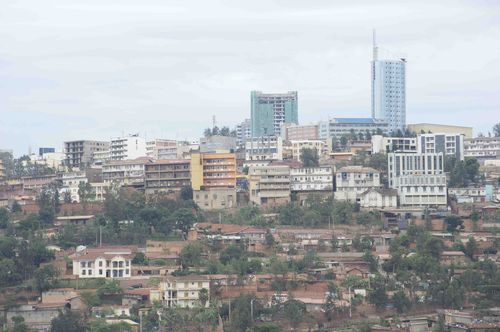
The following dispatch is from extreme kayaker, , a member of the . They are currently on an expedition in Africa to make a first descent of the .
Trip leader Hendri Coetzee has three rules leading up to our entry into the Democratic Republic of Congo.
Rule #1. Everything is going to take twice as long as it should.
Rule # 2. Everything is going to cost twice as much as it should.
Rule #3. No matter what happens, don't panic!
En route to the headwaters of the Congo after leaving t, we encounter a problem at the border of Uganda and Rwanda. Spending six months in the Congo last year, Hendri polished off his passport booklet with an exorbitant number of visas, which he was forced to purchase because of murky regulations and corrupt officials. He is on this trip with a brand new South African booklet, but has no entry stamp for Uganda. After an hour negotiating, stubborn border agents refuse Hendri exit until he demonstrates proof of entry. Not in the least frustrated, Hendri encourages Chris and I to go ahead to Kigali, Rwanda without him. He promises to resolve the problem ASAP.
I resolve to follow Rule #3.
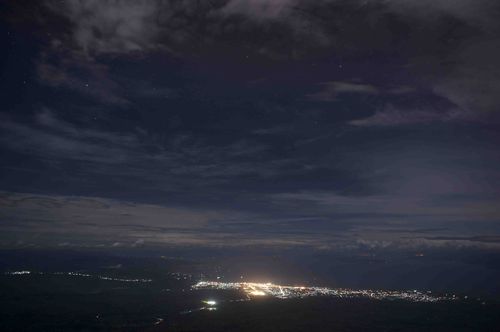
(Goma at night.)
To this day, the name Rwanda carries the heavy implications of one of the most horrific chapters in human history: t. It is important to note that the whole idea of Hutu vs Tutsi is just that… an idea. As it turned out, it was a very bad idea first proposed by the Colonial Belgians to account for the supposed anthropological differences among the ancient kingdom of Rwanda's seemingly three distinct ethnicities. During the century that followed, the Hutu and Tutsi designations resulted in a deadly splintering of the country. The nightmare began on April 7th, 1994. In just three months, over a million men, women, and children of Rwanda's Tutsi minority were brutally murdered by members of the Hutu majority and their Interahamwe Militia. This genocide, in addition to a mass exodus of nearly a million—mostly innocent—Hutu refugees fearing reciprocity, left the nation decimated and deserted.
As Chris and I make our way to the country's capitol, Kigali (see top photo), in a public taxis called Matatus, we see only evidence of the last 16 years—when Tutsi rebels led by current president Paul Kigame swept the Interahamwe Militia out of the country. To this day, Kigame rules the country with an iron grip on nearly every aspect of Rwandan life. It seems undeniable that the powerful president's influence has produced a sense of peace and stability that would be the envy of any country, let alone one sandwiched in the heart of volatile Sub-Saharan Africa. On the beautiful European-style road, we wind our way into the nation's capitol where shining new high rises stand like exclamation points to the country's promise and progress.
The next morning, we are back on track as Hendri shows up at our hotel on the back of a motor cycle taxi, removing a big green helmet to reveal an enthusiastic smile. “Isn't this place amazing! Even the Boda Boda here are organized with extra helmets and correct change,” announced Hendri.
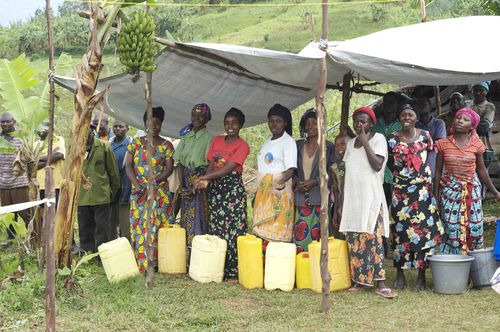
(Women waiting for water.)
The IRC In Rwanda
As part of our ongoing partnership with the , we meet up with their team in Rwanda to find out more. As one of the first Aid groups to confront the humanitarian crisis immediately following the tragedy of 1994, the success of the IRC in Rwanda means that today it maintains only a fraction of its former presence in the country. According to former IRC staff member and Rwandan parliamentarian Marie Jose, “Much of the basic infrastructure that the IRC helped build or rehabilitate—including large scale water systems, schools, and community finance organizations—are still working and now are run by the communities.” A quick look at the numbers certainly supports this assertion: today the tiny agrarian nation is leading the region with 76% of the population having access to potable water.
Rwanda to Congo
But in someways it seems that Rwanda's overnight success has been at the expense of the Democratic Republic of Congo (DRC). A case in point is a controversial 2010 UN report linked Rwandan troops to acts of atrocity in the Congo as Kigame's forces pursued and killed the Interhamwee militia and Hutu refugees fleeing into the Congo. Already destabilized by a century of Belgium servitude followed by Mobutu era thievery and mismanagement, the DRC soon devolved into the largest and bloodiest conflict since World War II, where most of the region's rebels and governments converged to battle for the Congo's unmatched mineral wealth. Despite peace treaties ending official combat in 2002, the DRC today remains in flux due to weak governance and a litany of rebel forces who maintain a deadly game of hide-and-go-plunder with bordering nations.
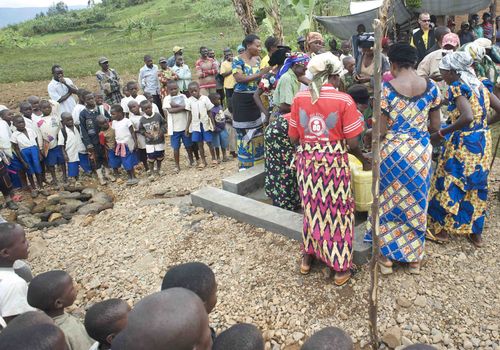
(Women collect water.)
The Fire at the Top on the Congo
We have come to Goma, DRC, because its active volcano, , is the proverbial top of the Congo River Basin. If Goma's designation as the “Rape Capital of the World”—or at least one of the most dangerous places in Africa isn't enough for this hard luck Congolese community—in 2002 the volcano sent out lava flows at 40 miles an hour that killed hundreds and displaced more than 120,000 people. Accompanied by armed guards, Chris, Hendri, and I trek five hours to the top of the volcano to spend a brutal, wind-swept night at 11,500 feet to bear witness to its lava lake, which is now said to be the largest on the planet.
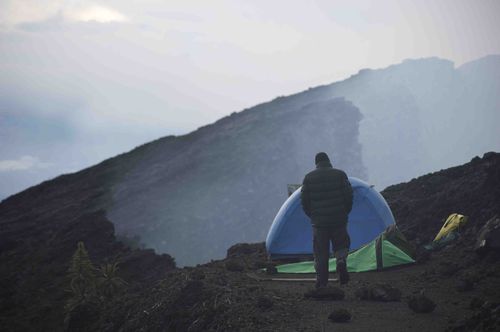
(Wind camp on Nyiragongo.)
The IRC in Congo
From a razor-wire and guard-post encased IRC compound in the shadow of the smoking volcano in Goma, we head out across mighty Lake Kivu by speed boat ferry as the first leg of our 1,000-mile journey down the Congo river. This 70-mile leg to Bukavu is a brilliant, bouncing affair with sodas and sandwiches passed between bone rattling impacts across the rain swept lake.
It is only in Bukavu that we are beginning to understand the unmatched impact of the IRC in the Congo. At its Bukavu headquarters the IRC is a modest 400-employee compound that is a large piece of the IRC's Congo humanitarian mission that can best be described in numbers. It is the largest NGO in a country half the size of the continental US, with a half-billion dollar Community Driven Construction.
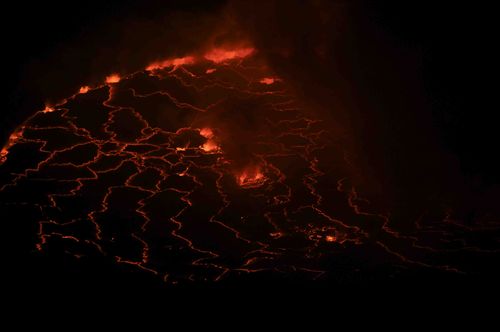
(Lava Lake)
As a testament to the IRC 's work in the DRC, and more specifically Bukavu, four hours ago we bare witness to an event you might only hope to see in a movie. A region of at least 5,000 people now has clean water running from brand new taps for the first time in history. Celebration was in-part an appreciation of the finance, organization, and catalyst of the IRC. It's apparent that the hard work and desire of the community was the real cornerstone of this success. It is also apparent that thousands more stories like this will need to take place in order to begin to solve this massive problem in the DRC, where as little as 15% of the population has access to safe potable water.
Back to the River
Next up, Chris, Hendri and I will dust off our kayaks and continue our journey into the Congo by entering the Rusisi river where it exits Lake Kivu en route to an 85 mile, 2,000 foot plunge to Lake Tanganyika. According to an IRC security briefing, this river that forms the border of Rwanda, DRC, and Burundi has never been navigated by boat and is strewn with unnavigable rapids. There was fighting just last week between rebel groups and government forces on the river and islands near Tanganyika. Also, there is a crocodile at the river's mouth named Gustav that is an ancient, well-fed man eater. If you are as worried about this next week of the expedition as we are, please take Hendri's advice and refer to Rule #3.
–Ben Stookesberry
Photos by Chris Korbulic